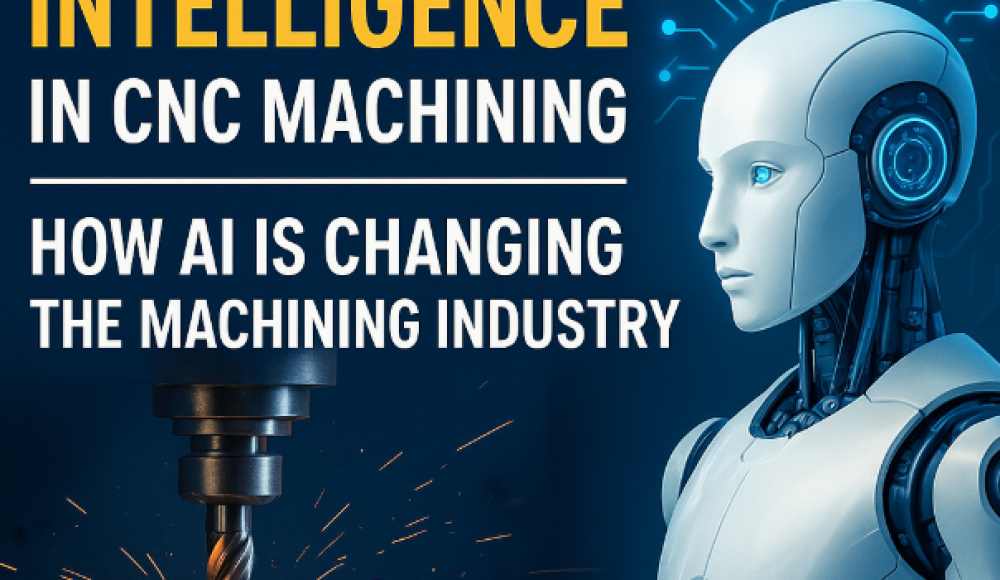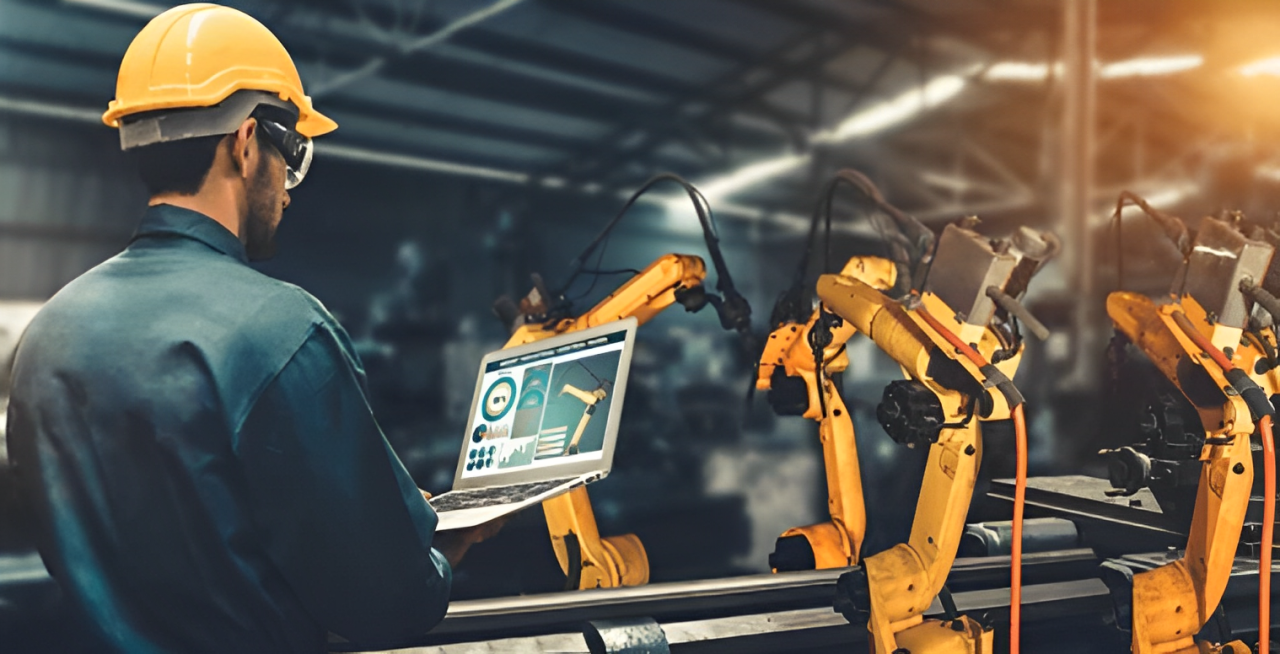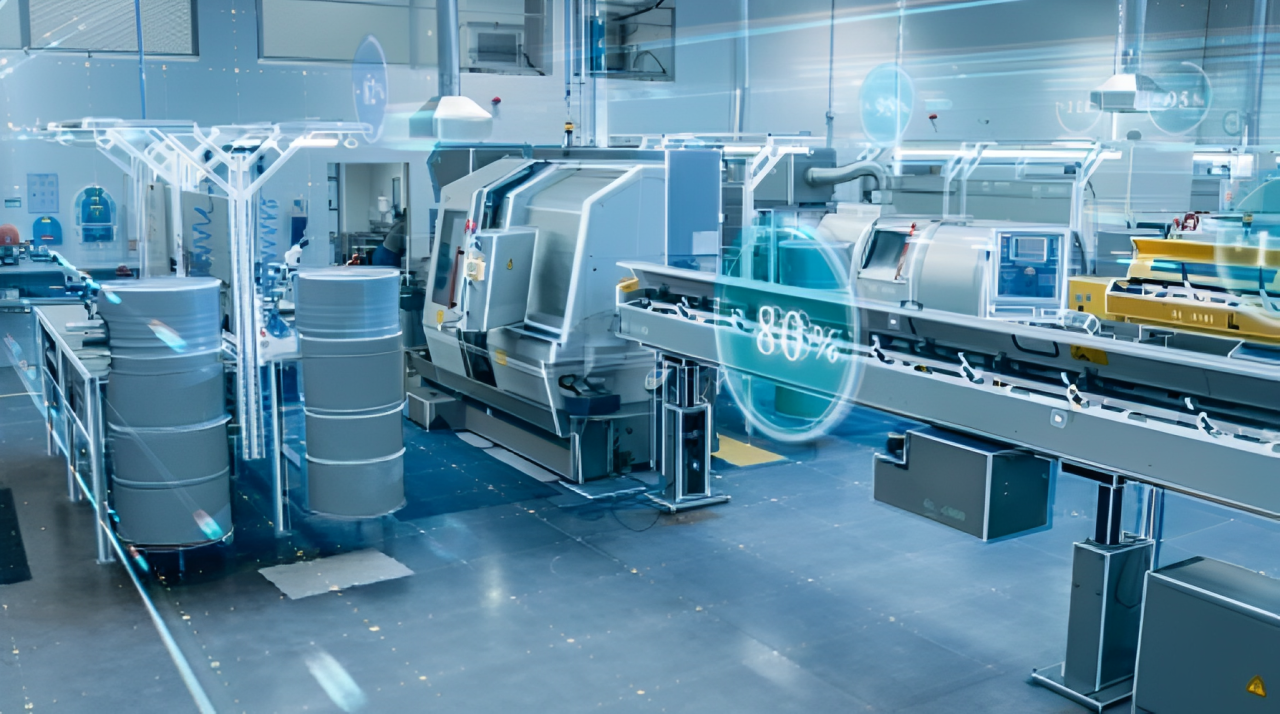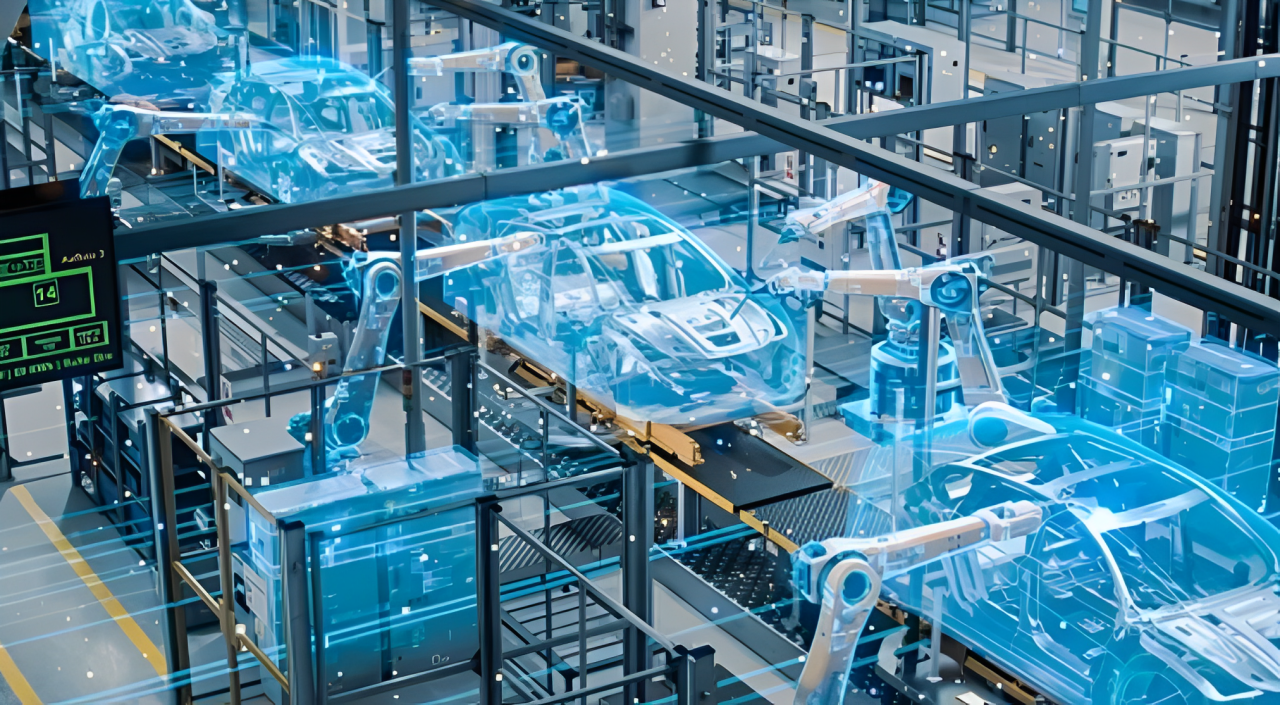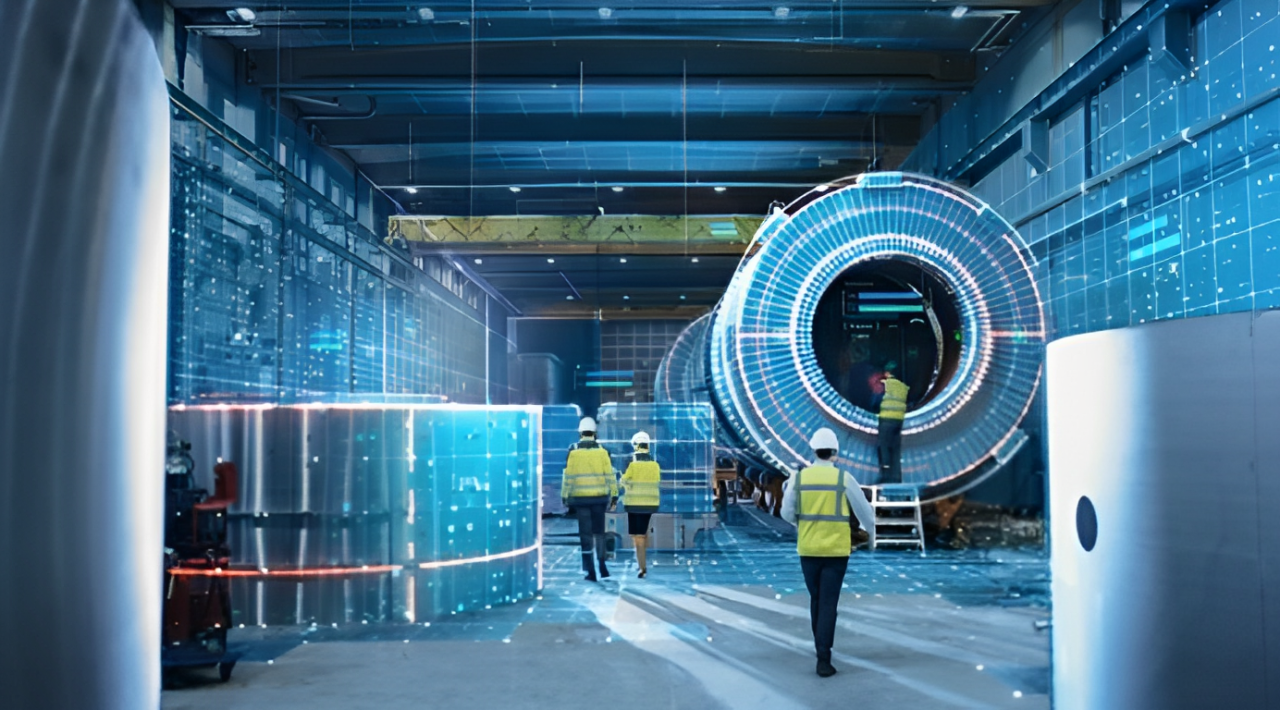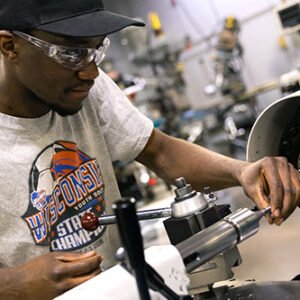A produção precisa e automatizada de geometrias de parte complexa tornou -se uma pedra angular de Usinagem CNC. A usinagem CNC está mudando sua fase devido à inteligência artificial (Ai). Ai ajuda a melhorar a eficiência, diminuir erros, e tornar a manutenção possível em Lojas de usinagem CNC. A integração da IA na usinagem CNC inclui controle de qualidade automatizado e otimização movida a IA, que estão mudando o futuro da indústria de manufatura.
Neste artigo, Aprendemos como a IA está alterando a fabricação da CNC, quais indústrias se beneficiam mais da automação de IA para CNC, e o futuro da fabricação habilitada para a AI.
Como você definiria a usinagem de IA?
A usinagem CNC mais inteligência artificial é chamada de usinagem de IA. Esses processos CNC são aprendizado de máquina, aprendizado profundo, e análise de dados. Facilita as decisões automatizadas, mais preciso, usa menos material, e otimiza os fluxos de trabalho de fabricação.
Algoritmos e usinagem inteligentes incorporam IA na pesquisa de informações genuínas do tempo. Eles podem ajudar a criar previsões sobre falhas do sistema e atualizar a eficácia da máquina para obter a máxima produtividade.
A usinagem CNC contém algumas tecnologias de IA central mencionadas abaixo:
- Manutenção preditiva, Otimização do processo, Ml.
- Visão computacional: Ajuda na detecção de defeitos e controle de qualidade.
- A análise de big data ajuda a tomar melhores decisões analisando os dados de produção.
- Automação de processo robótico (RPA): Tarefas repetitivas são automatizadas, E os humanos estão aliviados.
Principais indústrias usando IA na usinagem CNC
Diferentes setores usam plataformas de usinagem CNC baseadas em IA para maximizar a eficiência e a precisão da produção. As indústrias que usam IA para usinagem CNC incluem três grupos principais, quais são:
Aeroespacial
A indústria aeroespacial depende da usinagem CNC movida a IA para fabricação de componentes de alta precisão, ou seja, Blades de turbinas e peças de aeronaves. Os operadores podem identificar defeitos usando ai. Ele maximizará a eficiência do material e atende aos requisitos de segurança obrigatórios usando a IA.
Automotivo
Inteligência artificial (Ai) Controla os componentes do motor, peças de transmissão, e produtos de chassi resultantes de processos de usinagem. As linhas de produção de IA alcançam maior eficiência operacional e reduzem o número de erros durante a fabricação.
Dispositivos médicos
A produção de dispositivos médicos depende de manter a exatidão em todas as etapas. A produção de alta precisão de ferramentas cirúrgicas complexas, implantes, e próteses se torna possível através da tecnologia de IA. Ajuda a minimizar erros operacionais.
Eletrônicos e indústria de semicondutores
A otimização de usinagem CNC através da IA fornece precisão controlada para placas de circuito complicadas, microchips, e criação de componentes eletrônicos enquanto produz produtos miniaturizados.
Óleo & Indústria de gás
A usinagem CNC movida a IA resulta na produção de ferramentas de perfuração ao lado de componentes e válvulas de tubulação. Melhora os procedimentos de produção e reduz os riscos operacionais.
Ferramentas e máquinas movidas pela IA na usinagem CNC
Ferramentas avançadas e máquinas inteligentes estão ajudando a inteligência artificial (Ai) Para transformar a usinagem CNC. Com soluções de energia de IA, eficiência, precisão, e a automação minimiza a intervenção humana manual e até elimina erros. Vamos discutir isso.
Ferramentas movidas a IA
Aqui estão algumas das ferramentas movidas a IA na usinagem CNC;
Cam acionado por IA (Fabricação auxiliada por computador) Programas
O software CAM com ai otimiza o caminho da ferramenta e a sequência de usinagem, Cortar a perda de material e melhorar a eficiência. IA pode analisar entradas de design e restrições de máquina, Em seguida, extrapolar a melhor estratégia de corte para velocidade máxima de produção e precisão.
Sistemas de manutenção preditivos
Lá reside a manutenção preditiva baseada na IA que observa o desempenho da máquina CNC em tempo real. Temperatura, vibração, e o desgaste da ferramenta são sensores de dados coletados e analisados por algoritmos AI para prever falhas antes de ocorrerem. Imagina a máquina de inatividade e estende sua vida útil.
Sistemas de controle de qualidade baseados em IA
A usinagem CNC precisa de controle de qualidade. Para inspecionar peças a tais extremos de precisão, Os computadores são modelos de visão computacional e aprendizado de máquina orientados para IA que podem identificar defeitos microscópicos que os humanos perdem facilmente. Isso garante que os produtos tenham consistência e diminuam o desperdício.
Automação robótica com IA
Os sistemas de armas e automação robóticas fazem um trabalho fantástico ao lidar com tarefas de usinagem CNC com precisão e velocidade graças à AI. Produtividade do mundo real (Capacidade de carregar ou descarregar materiais, Alterar ferramentas, Ajuste os parâmetros de usinagem em tempo real) e o custo geral por não exigir mão de obra é aprimorado com esses robôs.
Software de simulação de processo AI-I-iable
Os fabricantes testam e otimizam os processos de usinagem por meio de ferramentas de simulação acionadas pela AAI antes de iniciar a produção real. Essas simulações podem fornecer previsões de problemas em potencial, ajustar estratégias de corte, e também são meio para aumentar a eficiência com menos erros e menos resíduos materiais.
II. Máquinas movidas a IA
Então, A seguir, são apresentadas as diferentes máquinas CNC que podem funcionar com a incorporação de IA:
Tornos de CNC inteligentes
AI e aprendizado de máquina em torno CNC inteligentes são usados para otimizar velocidades do eixo e taxas de alimentação. Em tempo real em condições de corte, Essas máquinas de otimização de auto-otimização analisam em tempo real e reduzem as vibrações, melhorar a precisão, e aumentar a vida da ferramenta.
Máquinas de moagem habilitadas para AI
Máquinas de moagem alimentadas por análise de feed de análise de dados em tempo real para melhorar a eficiência de corte. Os parâmetros de usinagem são ajustados dinamicamente para obter alta precisão com tempos de ciclo mais curtos e menos desperdício de material.
Máquinas de retificação de CNC autônomas
Máquinas de moagem com tecnologia de IA alteram automaticamente a pressão, velocidade, e profundidade conforme exigido em condições de material e ferramenta. Oferece melhor qualidade de acabamento da superfície e garante que a saída seja consistente com o mínimo de intervenção humana.
Impressoras 3D aprimoradas para usinagem
A usinagem é realizada com impressoras 3D acionadas por IA para formação de camadas que minimizam os defeitos e maximizam a utilização do material. As máquinas analisam dados de impressão anteriores para ajudar as execuções subsequentes a serem mais estruturalmente intactas e mais precisas.
Máquinas CNC multi-exis acionadas pela IA
Combinado com máquinas CNC de vários eixos, IA pode lidar com padrões geométricos mais complexos e maior precisão. Essas máquinas podem determinar dinamicamente os ângulos de corte, distribuição de força, e caminhos de ferramentas. além disso, Eles aumentam a velocidade de usinagem e minimizam erros na fabricação de alta precisão.
Aprendizado de máquina & Big data em máquinas CNC
Não se trata apenas de 1s e 0s em ferramentas físicas e máquinas CNC. Aprendizado de máquina, e especialmente análise de big data, Mudanças na indústria podem realizar manutenção preditiva, Otimização em tempo real, e tomada de decisão mais inteligente.
Manutenção preditiva
Algoritmos AI monitoram o desempenho da máquina CNC para rastrear eventos potencialmente falhados antes que eles aconteçam. Analisando dados da máquina, como níveis de vibração, mudanças de temperatura, ou padrões de desgaste, Os fabricantes podem agendar manutenção proativa para que o tempo de inatividade não ocorra inesperadamente.
Otimização de processos em tempo real
A transferência de sistemas orientada pela IA. Por exemplo, velocidade de corte, taxa de alimentação, e a posição da ferramenta para obter eficiência e precisão a um custo mínimo de produção estão incluídas.
Detecção automatizada de defeitos
Visão computacional e sistemas de detecção de defeitos baseados em IA são aplicados a peças fabricadas para analisar as peças em nível microscópico. Quando os fabricantes podem identificar que o mesmo ocorreu cedo o suficiente, então o resultado não será inconsistente e com defeito, pois não serão deixados para entrar no mercado.
Programação inteligente
Os sistemas de agendamento movidos a IA levam cargas de trabalho de máquina, disponibilidade de materiais, e prioridades de trabalho em contexto para criar seus cronogramas de produção ideais. Isso coloca o fim dos gargalos e aumenta a produtividade do pedido.
Análise de Big Data
As ferramentas de análise de produtos orientadas pela IA tentam revisar padrões de usinagem, Desgaste da ferramenta, e eficiência do processo. Os fabricantes podem aprender com os dados e usá -los para tomar decisões que otimizarão o fluxo de trabalho e a utilização de recursos e tornará a produção em geral mais eficiente.
Otimização de processos para lojas de máquinas CNC usando inteligência artificial
De fato, Não está apenas transformando processos de usinagem usando IA, mas também fornecendo novas direções sobre como as lojas de máquinas CNC devem ser gerenciadas. Utilizando análises baseadas em IA, automação, e algoritmos preditivos, Os fabricantes podem melhorar a eficiência. Eles podem diminuir os custos e maximizar o uso de recursos.
Abaixo estão algumas das principais áreas onde a IA começou a otimizar o lado de gerenciamento da usinagem CNC.
Otimizando o gerenciamento de inventário
Os sistemas de gerenciamento de inventário usam a IA para prever a necessidade de matérias-primas, dependendo dos dados históricos e das necessidades de produção em tempo real. Eles reduzem o excesso de estoque e sempre materiais essenciais nos sistemas.
Melhorando a eficiência da força de trabalho
Esses produtos de IA ajudam maquinistas e operadores a fazer informações em tempo real sobre o desempenho da máquina, Melhores parâmetros de corte, e alertas de manutenção preditiva. Tais sistemas permitem que os trabalhadores tomem decisões informadas, reduzindo erros manuais e aumentando a produtividade do piso da loja em geral.
Reduzindo o tempo de inatividade
O padrão de uso da máquina CNC funciona com AI, E eles também propõem estratégias de uso aprimoradas. A IA permite que os fabricantes identifiquem máquinas de baixo desempenho ou fluxos de trabalho ineficientes, o que ajuda a modificar cronogramas de produção e alocação de recursos para um produto, reduzindo o tempo de inatividade não planejado.
Automatando a programação de produção
Os sistemas de agendamento baseados em IA otimizam a coordenação do fluxo de trabalho analisando prioridades de trabalho, Disponibilidade da máquina, e capacidade da força de trabalho. Esses algoritmos monitoram atribuindo automaticamente tarefas para a máquina melhor aplicável, Qualquer que seja o procedimento ou quando o pedido precisa ser entregue.
Estratégias de redução de custos
A análise de custos com unidades de IA são consumo de energia, Taxas de desgaste da ferramenta, e despesas operacionais. Ai ajuda os fabricantes a entender o lucro, tempo, e custo vinculado à qualidade do produto. No processo, Identifique as oportunidades de economia de custos que lhes permitem fazer de dados orientados por dados, Decisões financeiramente sólidas para melhorar a lucratividade geral.
Impacto da IA na paisagem da fabricação de CNC
A inteligência artificial está mudando a fabricação de CNC com automação inteligente, tomada de decisão tática, e controle de qualidade superior. Sistemas baseados em IA estão se tornando mais eficientes, Ajudando a evitar desperdícios e criando novos níveis de precisão e personalização. Abaixo estão cinco maneiras principais de a IA está transformando a indústria.
Automação aumentando
As máquinas se tornam mais responsáveis assumindo responsabilidades complexas de usinagem, Desde a seleção de uma ferramenta até fazer ajustes no ponto até parâmetros de corte. Reduz erros humanos, Aumenta a velocidade de produção, e aumenta a consistência das operações de fabricação de grande volume.
Melhorando a produtividade
A IA analisa os sensores da máquina e o registro anterior do ciclo de produção para otimizar os ciclos de produção. Com ai, O objetivo é reduzir o tempo ocioso e obter a maior taxa de transferência, resultando em maior produtividade através do ajuste dinâmico dos parâmetros de usinagem.
Melhorando o controle de qualidade
Visão computacional & O aprendizado de máquina é usado em sistemas de detecção de defeitos alimentados por IA.. Para que eles possam detectar inconsistências em peças fabricadas. Esses sistemas detectarão erros no nível microscópico e permitirão apenas componentes de alta qualidade que façam seu processo de produção.
Reduzindo o desperdício de material
Ajuda a otimizar o uso do material com base em padrões de corte e evita a remoção desnecessária do material. Os estudantes universitários entendem que o impacto da IA na eficiência nas operações de usinagem reduzirá os resíduos, reduzindo assim os custos e promovendo a sustentabilidade no processo de fabricação.
Permitindo a personalização em massa
A personalização também é problemática para a fabricação tradicional devido a restrições de tempo e custo. Prototipagem rápida e personalização em lote em máquinas CNC, juntamente com projetos variáveis e parâmetros de usinagem, são alcançados pela usinagem CNC acionada pela IA. Isso permite que os fabricantes fabricem peças altamente personalizadas em escala, enquanto um aumento relativamente pequeno no custo.
Benefícios da IA na usinagem CNC
Precisão na inteligência artificial leva a defeitos de produto reduzidos por meio de seu processo de implementação.
- A implementação da tecnologia de automação controlada pela IA ajuda as lojas de máquinas a alcançar velocidades operacionais mais rápidas.
- A inteligência artificial usa seus recursos para reduzir as despesas operacionais, minimizando os custos de material e funcionários.
- Detecção precisa de falhas por meio de métodos de manutenção preditiva minimiza o tempo de inatividade das máquinas.
- O monitoramento do local de trabalho com base na tecnologia de IA permite uma melhor segurança da instalação por meio de sua implementação.
Desafios da IA na usinagem CNC
Os sistemas CNC orientados a IA exigem grandes custos de inicialização devido aos seus requisitos de capital.
- A integração complexa se torna um obstáculo ao tentar implementar operações de IA com máquinas CNC existentes.
- Especialistas operacionais que possuem conhecimento dos recursos de aprendizado de máquina e automação precisam trabalhar com sistemas baseados em IA.
- Os sistemas CNC baseados em IA enfrentam riscos potenciais de ataques cibernéticos que comprometem sua estrutura de segurança.
Futuro da usinagem CNC com IA
A nova tecnologia de usinagem CNC baseada em IA demonstra potencial significativo devido às suas principais melhorias.
- As máquinas CNC movidas a IA alcançarão a capacidade auto-operacional sem exigir muita assistência de operadores humanos.
- Os sistemas CNC operados a AI realizarão análise automática de falhas antes de executar reparos de máquinas auto-sustentáveis.
- Gêmeos digitais avançados-réplicas virtuais de máquinas CNC para monitoramento e otimização em tempo real.
- Poderes avançados de computação baseados em nuvem AI-INELIADA SISTEMAS CNC conectados a nuvem que permitem gerenciamento remoto do sistema.
- As fábricas implementam sistemas de máquinas inteligentes para construir operações de produção automatizadas de ponta a ponta.
Conclusão
Para concluir, A tecnologia de IA transformou a usinagem CNC em um sistema de melhoria de precisão com custos mais baixos e melhor eficiência operacional. A tecnologia de IA traz vantagens sem precedentes por meio de recursos de manutenção preditiva para sistemas automatizados de controle de qualidade e operações de fabricação de CNC.
Os benefícios da IA devem superar barreiras significativas, como despesas de implementação e ameaças à segurança. A perspectiva de usinagem CNC parece otimista porque a IA está desenvolvendo tecnologia que transformará as operações do setor por meio de máquinas autônomas avançadas.
Perguntas frequentes
- Como a usinagem CNC usa inteligência artificial?
É usado para otimizar os caminhos da ferramenta, prever falhas de máquina, melhorar o controle de qualidade, e automatizar processos de usinagem para maior precisão e eficiência com a ajuda de IA.
- Quais indústrias podem se beneficiar do uso de máquinas CNC controladas por inteligência artificial (Ai)?
A usinagem CNC acionada por IA é uma ferramenta de fabricação de precisão, e aeroespacial, Automotivo, Dispositivos médicos, Defesa, e as indústrias eletrônicas utilizam usinagem CNC orientada pela IA para fabricação de precisão.
- Quais são os principais problemas com os sistemas de IA para usinagem CNC?
Alguns desafios da adoção da IA incluem integração com sistemas legados, altos custos, riscos de segurança cibernética, e o risco de não possuir as habilidades na força de trabalho para a implementação da IA.
- A IA pode substituir os operadores humanos na usinagem CNC?
A IA automatizará tarefas repetitivas, mas ainda deixará espaços enormes para a experiência humana em supervisionar ações, projetando outras AIs, e inovando com eles.
- Qual é o futuro da IA na usinagem do CNC?
O futuro também incluirá usinagem autônoma, Cadeias de suprimentos acionadas por IA, Integração de computação quântica, e sustentabilidade na fabricação.

